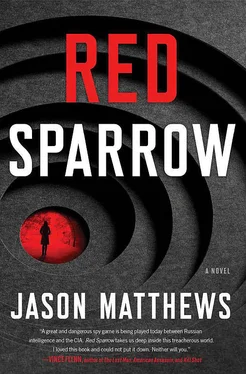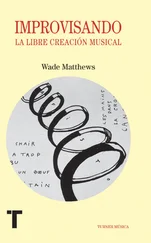“Forget about the internal target, the Finns are allies and we’ve got them covered. Marty and I work liaison, so you don’t have to worry about the internal service. We’ll pass along any unilateral possibilities that we develop.
“All the usual Arabs—Hezbollah, Hamas, Palestinians—they’ve all got reps in town. Might be tricky getting close to them, so think about access agents. Iranians, Syrians, Chinese. Small embassies, and they feel safe here in neutral Scandinavia. The Persians might be looking for embargoed equipment. Check them out on the dip circuit,” Forsyth said, tilting back in his office chair.
“I want to go after something bigger,” said Nate. “I have to score big after what happened to me in Moscow.” Indeed, thought Forsyth. He saw worry behind the eyes, determination in the set of the jaw. Nate sat upright in his chair.
“That’s fine, Nate,” said Forsyth, “but any recruitment, as long as it’s productive, is a good recruitment. And you land the big fish by being patient, by working the circuit, by generating a dozen developmental contacts.”
“I know that, Chief,” said Nate quickly. “But I don’t have the luxury of time. That Gondorf is gunning for me. If it weren’t for you, I’d be back in Russian Ops in front of a computer, pushing a mouse. I never told you how much I appreciate your asking for me.”
Forsyth had read Nate’s personnel file, sent out to Station when Nate’s lateral assignment had been approved. Not many young case officers with near-fluent Russian. Top marks throughout training at the Farm, and subsequently in “denied area” training for Moscow, the art of operating under constant hostile surveillance. The file also positively noted Nate’s performance in Russia, especially his handling of a sensitive restricted case—no details.
But Forsyth now saw a distracted young case officer squirming in front of him. With something to prove. Not good, makes you accident-prone, always swinging for the fences with your eyes closed.
“I don’t want you worrying about Moscow. I talked to some people in Headquarters and you’re fine.” He saw Nate’s face working at the thought of his hall file. “And I want you to listen to me,” said Forsyth. He stopped until he had Nate’s attention. “I want you to work smart, good tradecraft, no shortcuts. We all want the big cases—hell, you’re handling one now—but I won’t accept half-assed operations. Clear?” Forsyth looked hard at Nate. “Clear?” he repeated.
“Yessir,” said Nate. He got the message, but told himself he was going to find agents, he wasn’t going to flame out as a case officer. He was not going home. He flashed to crazy-quilt images of him in a Richmond country club sitting across from Sue Ann or Mindy, bee-stung lips and frosted hair piled high, as his brothers putted golf balls across the tartan plaid rug into one of Missy’s pink Lilly Pulitzer flats lying on the rug across the club room. Fuck no.
“Okay,” said Forsyth. “Find your desk. It’ll be the first office down the hallway. Get out of here and go find Gable,” he said, reaching for his in-box.
=====
DCOS Marty Gable was sitting at his terminal in another small office one door down from Forsyth’s, trying to figure out how to write a cable to Headquarters without using the word “cocksucker.” Older than Forsyth, Gable was in his late fifties, big and broad shouldered, with white brush-cut hair, blue eyes, and a steel girder for a nose. His forehead was tanned and ruddy, the weather-beaten face of an outdoorsman. Knuckly brown hands dwarfed his keyboard, immobile. He hated drafting cables, hated typing with two fingers, hated the bureaucracy. He was a street guy. Nate stood in the doorway of his office. It was totally bare, unadorned save for a government-issue picture of the Washington Monument on the wall. His desktop was empty. Before Nate could knock courteously on the door frame, Gable swiveled in his chair and looked at Nate with a scowl.
“You the new guy? Cash?” bawled Gable. The accent was somewhere from the Rust Belt.
“Nash. Nate Nash,” said Nate, as he walked to the desk. Gable remained sitting but extended his frying-pan hand. Nate tensed for the inevitable bone-crushing grip.
“You took your time getting here. You recruit anyone on the way in from the airport?” Gable laughed. “No? Well, there’s time after lunch,” he said. “Let’s go.” On the way out of the Station, Gable stuck his big Rottweiler head into several offices along the hallway, checking to see what the other Station case officers were doing. They were empty. “Good,” said Gable, “everyone’s ass out on the street. The fucking world as it should be.”
Gable took Nate to lunch in a grubby little Turkish restaurant in a small snow-filled alley near the train station. The steamy single dining room had half a dozen tables, a pass-through window from the kitchen, and a framed portrait of Atatürk on the wall. People were yelling in the kitchen, but when Gable went to the window and clapped his hands the noise stopped. A thin dark man with a black mustache and an apron parted the bead curtain and came out of the kitchen. He embraced Gable briefly and was introduced as Tarik, the owner. The Turk shook hands loosely without looking into Nate’s eyes. They took a corner table and Gable pulled out the chair he wanted Nate to sit in, against the wall with a view of the door. Gable sat with his back to the other wall. Speaking Turkish, Gable ordered two Adana kebabs, two beers, bread, and salad.
“I hope you like spicy,” said Gable. “This little shithole has the best Turkish food in the city. There are a lot of immigrants from Turkey around here.” Gable looked at the kitchen. He leaned forward. “I popped Tarik about a year ago, support asset, you know, pick up mail, pay rent on a safe house, keep his ear to the ground. A couple hundred a month and he’s happy. If we need to, we can tap into the expat community in Helsinki.” Gable straightened as the food came, two long flat kebabs speckled with red pepper, grilled a dark brown. A large broiled flatbread, splashed with melted butter, was underneath. Raw onion salad sprinkled with dark red sumac and lemon was piled on the side of the plate. Two sweating bottles of beer were plunked on the table as Tarik muttered, “ Afiyet olsun, may it be good for you,” and withdrew.
Gable began eating before Nate picked up his fork. He wolfed food, talking and moving his big mitts in the air. “Not bad, eh?” he asked of the kebabs, his mouth full. He upended his beer and drank half the bottle. His jaws snatched at the food, gazelle going down the gullet of a crocodile. Without preamble or embarrassment, he asked Nate what the fuck had happened in Moscow between him and that asshole Gondorf.
Mortified, his worries rekindled, Nate explained briefly, a few sentences. Gable pointed at him with his fork. “Listen up: Remember two things about this fucking business. You can never mature as an operator unless you’ve failed, large, at least once. And you’re judged by your accomplishments, the results you bring, and how you protect your agents. Nothing else matters.” The other half of the bottle disappeared and Gable called for another. “Oh, and there’s another thing,” he said. “Gondorf’s a douche bag. Don’t worry about him.”
Gable was finished with his entire plate before Nate even had gotten through half of his. “Did you ever fail in your career?” he asked Gable.
“Are you kidding?” said Gable, tilting back his chair. “I was in the shit so often I rented the top floor of the latrine. That’s how I got here. After the most recent train wreck, Forsyth saved my ass.”
=====
Gable’s career had been spent primarily on the Shithole Tour—Third World countries in Africa and Asia. Some case officers make their bones in the restaurants and hotel rooms and sidewalk cafés of Paris. Gable’s world was one of midnight meetings on deserted dirt roads in red-dust-covered Land Rovers. Other officers tape-recorded their meetings with government ministers. Gable wrote secrets into a sweat-damp notebook while sitting with agents sour with fear, making them concentrate, making them stay fucking on topic. They would sit in the heat, engine block ticking, with the windows up, watching the heads of the mambas part the tops of the tall grass on either side of the vehicle. Nate had heard that Gable was a legend. He was loyal to his assets, then to his friends, then to the CIA, in that order. There was nothing he hadn’t seen, and he knew what was important.
Читать дальше












